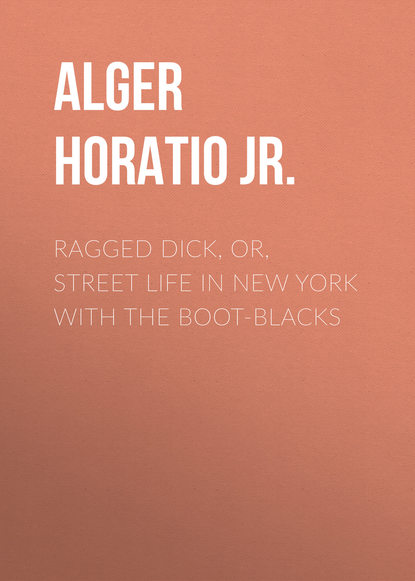По всем вопросам обращайтесь на: info@litportal.ru
(©) 2003-2024.
✖
Ragged Dick, Or, Street Life in New York with the Boot-Blacks
Настройки чтения
Размер шрифта
Высота строк
Поля
"Do you remember what bank it was on?"
"It was on the Merchants' Bank of Boston."
"Are you sure of it?"
"I am."
"Perhaps the boy kept it and offered the other."
"You may search me if you want to," said Dick, indignantly.
"He doesn't look as if he was likely to have any extra bills. I suspect that your clerk pocketed the good bill, and has substituted the counterfeit note. It is a nice little scheme of his for making money."
"I haven't seen any bill on the Merchants' Bank," said the clerk, doggedly.
"You had better feel in your pockets."
"This matter must be investigated," said the merchant, firmly. "If you have the bill, produce it."
"I haven't got it," said the clerk; but he looked guilty notwithstanding.
"I demand that he be searched," said Dick's patron.
"I tell you I haven't got it."
"Shall I send for a police officer, Mr. Hatch, or will you allow yourself to be searched quietly?" said the merchant.
Alarmed at the threat implied in these words, the clerk put his hand into his vest-pocket, and drew out a two-dollar bill on the Merchants' Bank.
"Is this your note?" asked the shopkeeper, showing it to the young man.
"It is."
"I must have made a mistake," faltered the clerk.
"I shall not give you a chance to make such another mistake in my employ," said the merchant sternly. "You may go up to the desk and ask for what wages are due you. I shall have no further occasion for your services."
"Now, youngster," said Dick's patron, as they went out of the store, after he had finally got the bill changed. "I must pay you something extra for your trouble. Here's fifty cents."
"Thank you, sir," said Dick. "You're very kind. Don't you want some more bills changed?"
"Not to-day," said he with a smile. "It's too expensive."
"I'm in luck," thought our hero complacently. "I guess I'll go to Barnum's to-night, and see the bearded lady, the eight-foot giant, the two-foot dwarf, and the other curiosities, too numerous to mention."
Dick shouldered his box and walked up as far as the Astor House. He took his station on the sidewalk, and began to look about him.
Just behind him were two persons,—one, a gentleman of fifty; the other, a boy of thirteen or fourteen. They were speaking together, and Dick had no difficulty in hearing what was said.
"I am sorry, Frank, that I can't go about, and show you some of the sights of New York, but I shall be full of business to-day. It is your first visit to the city, too."
"Yes, sir."
"There's a good deal worth seeing here. But I'm afraid you'll have to wait to next time. You can go out and walk by yourself, but don't venture too far, or you will get lost."
Frank looked disappointed.
"I wish Tom Miles knew I was here," he said. "He would go around with me."
"Where does he live?"
"Somewhere up town, I believe."
"Then, unfortunately, he is not available. If you would rather go with me than stay here, you can, but as I shall be most of the time in merchants'-counting-rooms, I am afraid it would not be very interesting."
"I think," said Frank, after a little hesitation, "that I will go off by myself. I won't go very far, and if I lose my way, I will inquire for the Astor House."
"Yes, anybody will direct you here. Very well, Frank, I am sorry I can't do better for you."
"Oh, never mind, uncle, I shall be amused in walking around, and looking at the shop-windows. There will be a great deal to see."
Now Dick had listened to all this conversation. Being an enterprising young man, he thought he saw a chance for a speculation, and determined to avail himself of it.
Accordingly he stepped up to the two just as Frank's uncle was about leaving, and said, "I know all about the city, sir; I'll show him around, if you want me to."
The gentleman looked a little curiously at the ragged figure before him.
"So you are a city boy, are you?"
"Yes, sir," said Dick, "I've lived here ever since I was a baby."
"And you know all about the public buildings, I suppose?"
"Yes, sir."
"And the Central Park?"
"Yes, sir. I know my way all round."
The gentleman looked thoughtful.
"I don't know what to say, Frank," he remarked after a while. "It is rather a novel proposal. He isn't exactly the sort of guide I would have picked out for you. Still he looks honest. He has an open face, and I think can be depended upon."
"I wish he wasn't so ragged and dirty," said Frank, who felt a little shy about being seen with such a companion.
"I'm afraid you haven't washed your face this morning," said Mr.
Whitney, for that was the gentleman's name.











